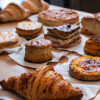
Embark on a sweet journey into the world of pastries with our comprehensive guide to baking for beginners. Whether you're looking to make flaky croissants, buttery shortbread, or decadent cream puffs, here's everything you need to get started – no culinary degree required!
Getting Familiar With Basic Baking Tools
Every aspiring baker needs to start with the right tools. Essentials such as mixing bowls, spatulas, baking pans, pastry brushes, and measuring cups and spoons are the backbone of every successful baking venture. For the more intricate designs, consider acquiring a rolling pin, cookie cutters, and possibly a kitchen mixer. When equipped with these tools, baking a range of pastries becomes a breeze.
Understanding Essential Baking Ingredients
The quality of your ingredients directly influences the taste of your pastries. You'll frequently deal with flour, baking powder, baking soda, butter, sugar, and eggs, each playing unique roles in the baking process. Know their functions, optimal storage practices and substitution possibilities, as this knowledge can save your recipe if you find yourself missing an ingredient.
Mastering The Art of Mixing
Mixing might seem basic, but mastering it can change your pastry game. Over-mixing can result in tough pastries while under-mixing might leave you with lumpy or unevenly cooked products. Achieving a fine balance is key. Remember to incorporate ingredients at room temperature unless specified otherwise. Mix the dry and wet ingredients separately at first then combine with care.
Understanding Pastry Dough Basics
Most pastries start with a dough. Mastering a few staple dough recipes such as shortcrust, puff pastry, choux, and sweet paste can open up endless possibilities. Knowing the right textures and consistency to achieve with each, along with tips on rolling, kneading, and resting dough, will set you up for success.
Learning Different Baking Methods
Baking, roasting, grilling, and broiling are all methods you can use in your pastry masterpieces, each bringing out different textures and flavors. While Baking is the standard for most pastries, don't be afraid to explore other methods to get creative with your baking.
Perfecting Baking Temperature and Timing
A perfect pastry is a result of accurate timing and temperature. Over-baking can dry out your pastries, while under-baking might leave them raw or soggy. Understand the significance of preheating and get acquainted with your oven's hot spots for optimal baking. Learning to read cooking cues like a slight bounce to touch or browning edges will guide you in perfecting the baking time.
















